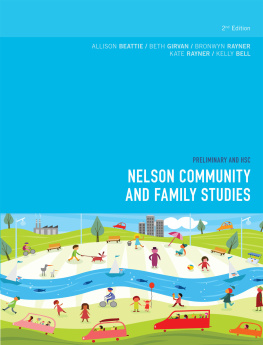PRELIMINARY CORE:
RESOURCE
MANAGEMENT
MODULE FOCUS
Fundamental concepts of resource management (p. )
Influences on resource management (p. )
Effective resource management (p. )
OUTCOMES
A student:
P1.1
describes the contribution an individuals experiences, values,
attitudes and beliefs make to the development of goals
P1.2
proposes effective solutions to resource problems
P3.2
analyses the significance of gender in defining roles and relationships
P4.1
utilises research methodology appropriate to the study of social issues
P4.2
presents information in written, oral and graphic form
P5.1
applies management processes to maximise the efficient use of resources
P6.1
distinguishes those actions that enhance wellbeing
1 PRELIMINARY CORE: RESOURCE MANAGEMENT
ISBN: 9780170347990
iStockphoto/damircudic
FUNDAMENTAL CONCEPTS OF RESOURCE
MANAGEMENT
Wellbeing
wellbeing
The degree of
satisfaction that an
individual or group
experiences when needs
are met
Defining wellbeing
Wellbeing may be defined as the degree of satisfaction that an individual or group experiences when
needs are met. Having sustained wellbeing contributes to being happy and healthy and can increase an
individuals life expectancy. The wellbeing of individuals and families can be very complex because the set
of items, factors or characteristics that contribute to the wellbeing of one individual or group may not be
the same as those for another individual or group. However, it is likely that there will be a set of universal
factors that are common to all. These factors influence the range of needs that an individual or group
perceives as vital to their life and can be grouped into six broad areas: physical, social, emotional, spiritual,
economic and cultural. The SPEECS mnemonic can help you remember these areas.
S Social
P Physical
E Emotional
E Economic
C Cultural
S Spiritual
Factors affecting wellbeing
In Community and Family Studies, our understanding of wellbeing is holistic as a variety of factors are
recognised. Together or separately, the six factors that affect our wellbeing can have a positive or negative
impact on our being. If the effect includes positive emotions and moods, an optimistic perspective on
life and a general sense of feeling good we can describe this as wellbeing. If, on the other hand, the effect
includes experiences of negative emotions and a general sense of not feeling well, we can describe this
as ill being. These terms are not diametrically opposite but can be viewed as existing on a sliding scale
or continuum. We can also experience higher levels of wellness in some aspects and less in others this
helps to illustrate the subjective and changing nature of our wellbeing. If, for example, we lose a cherished
pet, we may feel emotionally upset and unwell; however, the shared support in our family may assist us in
maintaining a positive perspective and wellbeing.
NELSON COMMUNITY AND FAMILY STUDIES
ISBN: 9780170347990
Emotional factors
Emotional factors are related to our feelings. As our feelings are dependent, in many cases, on interaction
with other people, many social and emotional factors overlap. Examples of emotional needs include:
attachment and bonding, giving and receiving love and affection, feeling a sense of belonging
security and stability within the family unit and social group
receiving encouragement
promotion of a good self-image and self-concept
independence that is age appropriate
the opportunity for self-expression and creativity.
When emotional needs are met, a person is more resilient and is more likely to successfully cope
with stress.
Economic factors
Economic factors are related to finances. These factors are addressed through:
paid employment, bank accounts, credit, budgeting, inheritance, shares or welfare
job security, equitable working conditions and access to flexible work patterns
increased knowledge and skills.
There is a relationship between economic situation and wellbeing. An individual in a well-paid job
is more likely to have an adequate standard of living, be able to meet all of their needs and consider
satisfying a range of wants. Conversely, an individual with little financial income may have poorer housing
and less ability to meet basic needs, such as access to medical services. This will affect many aspects of
wellbeing.
Cultural factors
Cultural factors focus on customs, beliefs, values and traditions. They are satisfied by:
identifying with and belonging to a cultural group
teaching and developing customs, beliefs, values and traditions of families and communities
having opportunities to maintain cultural heritage through story, dance, language, diet and/or dress.
The individual involved in cultural activities has a greater sense of identity. There is a sense of belonging
that also provides emotional security.
Physical factors
Physical factors relate to physical health and safety. They include having:
adequate nourishment for normal growth, development and good health
adequate sleep and rest
regular health care
safety and security from external hazards and weather
regular physical activity.
Often physical issues can affect other factors. Eating well and feeling physically fit can contribute to our
resistance to sickness and our ability to deal with problems that may occur. A student who eats nutritious
foods, sleeps well and exercises regularly is likely to cope better during high-stress periods; for example,
when studying for exams.
Spiritual factors
Spiritual factors relate to moral or religious areas. They include:
developing ideals, aspirations and personal values
identifying right from wrong
having a purpose in life
understanding religious principles.
A person with spirituality may experience greater peace and emotional stability. They may experience a
sense of belonging within their community. The family may have beliefs around healthy living and having
effective social relationships. Spirituality may also be experienced through nature, art and music, or found
through relaxation and a connection with the mind, body and soul through yoga or meditation.
spiritual factors
Factors relating to moral
and/or religious areas
cultural factors
Factors relating to
customs, beliefs, values
and traditions
economic factors
Factors relating to
finance
emotional factors
Factors relating to
feelings
physical factors
Factors relating to
physical health and
safety
1 PRELIMINARY CORE: RESOURCE MANAGEMENT
ISBN: 9780170347990












